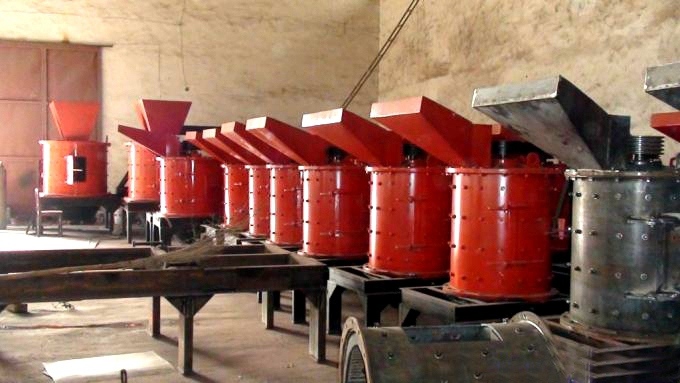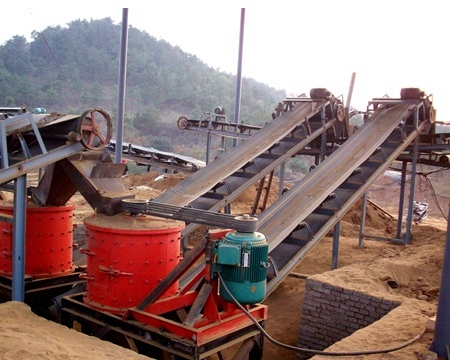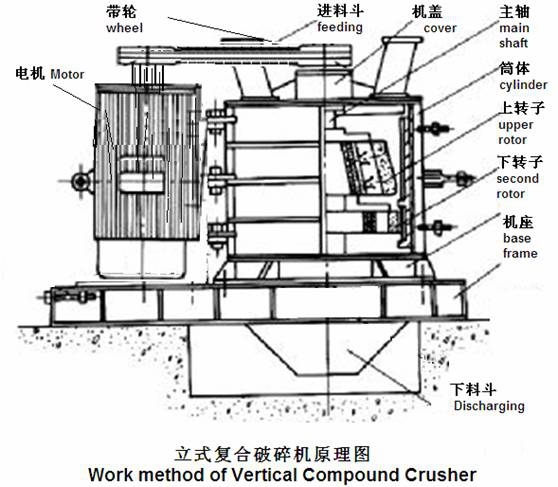1. Introduction
PFL vertical compound crusher is new product based on the PCL vertical compound crusher and domestic and overseas fine crushing technology.

2. Advantages
It owns the advantages of large crushing ratio, 1.4 times higher than other domestic similar machines; High efficiency and energy-saving; The life of the wearing parts increased 2-3 times; Adjustable gap between hammer and impact plate, which can satisfy different sizes requirement. It is widely used in mining, metallurgy, refractory, cement, coal, glass, ceramics, and electric power industries.
3. Application
The vertical compound crusher is fine crushing equipment that crushes materials in middle hardness, such as rocks and mines with pressure strength less than 210MPa and humidity less than 5%. e. g. Limestone, dolomite, cement clinker, iron ore, molybdenum ore, aluminum, cobble, rock phosphorite, copper ore, burned magnesite, serpentine, calces, gypsum, lump coal, zeolite, sandstone and so on. It is widely used in the industry of mining, metallurgy, building materials, fireproof materials, cement, coal, glass, chemical industry, electricity power and so on.

4. Working Principle
The motor drives the rotor that fixed on the main bearing to run quickly toward certain direction when the machine works. The materials are fallen into the throw-up disc and impacted by the high speed strips of the throw-up disc, and then strikes with the impact board under the effect of Centrifugal Force.
Because the impact board is bevel and the gravitation, the materials are threw to the taper crushing room and impacted by the high-rotating up hammerhead. After gaining sufficient energy, the materials are thrown to the impact board again and action repeats. The materials strike with each other in the crushing room and then are down to the column-shape rotor room. Then crushed, pressed, and ground and action repeats. In this way, the materials go through up, middle, and down rotor crushing rooms and crushed, pressed, and ground by the hammers and the impact boards, and finally the materials are gradually crushed into needed sizes and come out.

5. Features
The machine has special structure in the part of throw-up disc, which can improve the usage of abrasive material and reduce the cost. The wearing parts are made of anti-abrasion material (metal alloy in high hardness and toughness), so it can endure for long time. It has the advantage of high crushing ratio, large output, high efficiency, and low consumption. It is of easy operation, good performance, low noise, little vibration and good airproofing, so it is a high efficient and high level fine crushing equipment.
6. Technical Data
| Type | Main shaft rotating (r/min) |
Feeding size (mm) |
Output size (mm) |
Motor power (kw) |
Capacity (t/h) |
| PFL-800 | 1000 | < 50 | < 3-5Â 60-90% | 15-22 | 10-20 |
| PFL-1000 | 750 | < 120 | < 3-5Â 60-90% | 37-55 | 20-45 |
| PFL-1250 | 530 | < 150 | < 3-5Â 60-90% | 55-75 | 40-70 |
| PFL-1500 | 495 | < 120 | < 3-5Â 60-90% | 132 | 70-100 |
| PFL-1750 | 424 | < 120 | < 3-5Â 60-90% | 160 | 130-190 |
| PFL-2000 | 370 | < 120 | < 3-5Â 60-90% | 185 | 100-160 |
1. Introduction
PFL vertical compound crusher is new product based on the PCL vertical compound crusher and domestic and overseas fine crushing technology.

2. Advantages
It owns the advantages of large crushing ratio, 1.4 times higher than other domestic similar machines; High efficiency and energy-saving; The life of the wearing parts increased 2-3 times; Adjustable gap between hammer and impact plate, which can satisfy different sizes requirement. It is widely used in mining, metallurgy, refractory, cement, coal, glass, ceramics, and electric power industries.
3. Application
The vertical compound crusher is fine crushing equipment that crushes materials in middle hardness, such as rocks and mines with pressure strength less than 210MPa and humidity less than 5%. e. g. Limestone, dolomite, cement clinker, iron ore, molybdenum ore, aluminum, cobble, rock phosphorite, copper ore, burned magnesite, serpentine, calces, gypsum, lump coal, zeolite, sandstone and so on. It is widely used in the industry of mining, metallurgy, building materials, fireproof materials, cement, coal, glass, chemical industry, electricity power and so on.

4. Working Principle
The motor drives the rotor that fixed on the main bearing to run quickly toward certain direction when the machine works. The materials are fallen into the throw-up disc and impacted by the high speed strips of the throw-up disc, and then strikes with the impact board under the effect of Centrifugal Force.
Because the impact board is bevel and the gravitation, the materials are threw to the taper crushing room and impacted by the high-rotating up hammerhead. After gaining sufficient energy, the materials are thrown to the impact board again and action repeats. The materials strike with each other in the crushing room and then are down to the column-shape rotor room. Then crushed, pressed, and ground and action repeats. In this way, the materials go through up, middle, and down rotor crushing rooms and crushed, pressed, and ground by the hammers and the impact boards, and finally the materials are gradually crushed into needed sizes and come out.

5. Features
The machine has special structure in the part of throw-up disc, which can improve the usage of abrasive material and reduce the cost. The wearing parts are made of anti-abrasion material (metal alloy in high hardness and toughness), so it can endure for long time. It has the advantage of high crushing ratio, large output, high efficiency, and low consumption. It is of easy operation, good performance, low noise, little vibration and good airproofing, so it is a high efficient and high level fine crushing equipment.
6. Technical Data
| Type | Main shaft rotating (r/min) |
Feeding size (mm) |
Output size (mm) |
Motor power (kw) |
Capacity (t/h) |
| PFL-800 | 1000 | < 50 | < 3-5Â 60-90% | 15-22 | 10-20 |
| PFL-1000 | 750 | < 120 | < 3-5Â 60-90% | 37-55 | 20-45 |
| PFL-1250 | 530 | < 150 | < 3-5Â 60-90% | 55-75 | 40-70 |
| PFL-1500 | 495 | < 120 | < 3-5Â 60-90% | 132 | 70-100 |
| PFL-1750 | 424 | < 120 | < 3-5Â 60-90% | 160 | 130-190 |
| PFL-2000 | 370 | < 120 | < 3-5Â 60-90% | 185 | 100-160 |
In addition to its industrial uses, phosphorus pentasulfide has also been used in the laboratory for the synthesis of various organic compounds, including thioesters, thioamides, and thioethers. It is typically used as a reagent in these reactions, as it can convert carboxylic acids and other functional groups into their corresponding thio derivatives.
Phosphorus pentasulfide (P2S5) is a chemical compound composed of two phosphorus atoms and five sulfur atoms. It is a yellowish-green solid that is insoluble in water but soluble in most organic solvents.
Phosphorus pentasulfide is commonly used in organic synthesis as a reagent for the conversion of alcohols to thiols and thioesters. It is also used in the production of insecticides, fungicides, and herbicides.
Phosphorus pentasulfide is a highly reactive and flammable compound that can pose a significant health hazard if not handled properly. It can cause severe irritation to the eyes, skin, and respiratory system, and is considered a potential carcinogen. Proper protective equipment, such as gloves and goggles, should be worn when handling this compound.
Phosphorus pentasulfide (P2S5) is a highly reactive and dangerous chemical compound that is commonly used in the production of pesticides, lubricants, and other industrial chemicals. It is a yellowish solid that can be easily ignited and releases toxic fumes when exposed to air or water.
Exposure to phosphorus pentasulfide can cause severe respiratory and skin irritation, as well as eye damage. Inhalation of the fumes can lead to coughing, wheezing, and shortness of breath, while skin contact can cause burns, blisters, and chemical burns.
Phosphorus pentasulfide is also highly flammable and can ignite spontaneously when exposed to air or moisture. It reacts violently with water, releasing toxic hydrogen sulfide gas, which can cause respiratory failure and even death.
Due to its highly reactive nature and potential health hazards, phosphorus pentasulfide should only be handled by trained professionals in a controlled environment with appropriate safety measures in place.
Phosphorus Pentasulfide,Phosphorus Pentasulfide Cas 1314-80-3,Phosphorus Pentasulfide Hazardous Chemical,Dangerous Chemical Phosphoric Sulfide
Sichuan Jinhe Qihang Co,. Ltd. , https://www.jinhechemicals.com